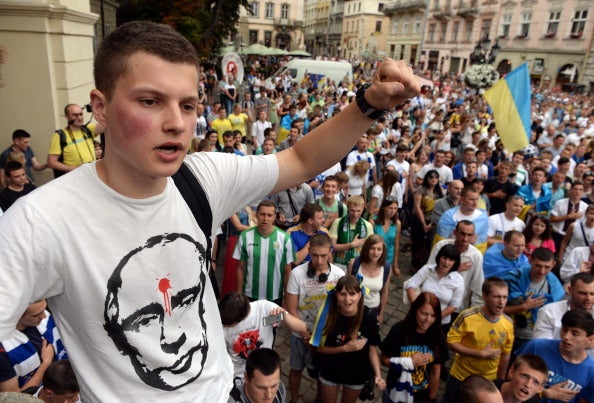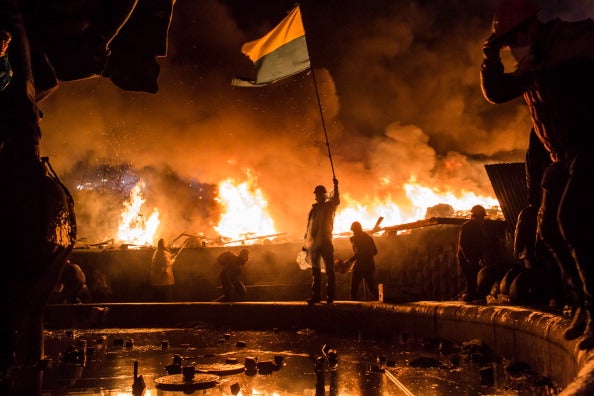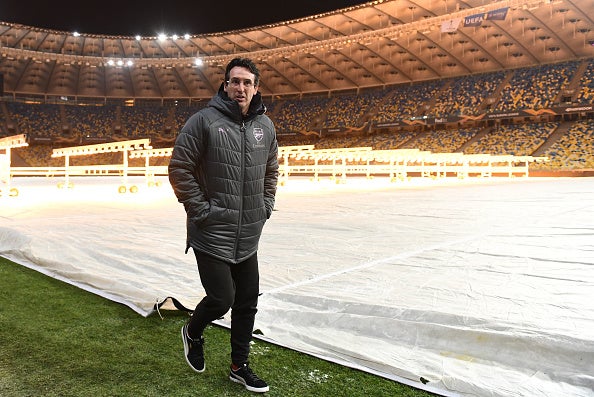FC Vorskla vs Arsenal: Why venue switch sees Ukrainian football take another step into politics and away from the East
Political turmoil has breached the bare birch trees of provincial Poltava for the first time in four years

Under the crusted blanket of snow which covers Poltava in Eastern Ukraine, host to the famous fixture with Arsenal which never was, there is a curiously unblemished statue cast onto a bench in the city’s central park. A figure a smidgeon larger than life-sized, whose bronze reflects in the twinkling granules of ice and sits in a stern posture, arm outcast as though beckoning you to sidle up next to him and hear some sage advice.
The effigy is of Oleh Babayev, the former mayor of Kremenchuk, a city within the Poltava Oblast and president of FC Vorskla who was shot three times in the chest in the driver’s seat of his Mercedes by an unknown assassin armed with a silenced pistol in July 2014.
The perpetrator unsurprisingly escaped in a manner which any contracted killer armed with a military-grade weapon suppressor is probably expected to as part of his licensing package, while the interior ministry spox, Anton Gerashchenko, claimed the motive behind the murder was the mayor’s support of the pro-Ukrainian protestors who had overthrown the government in the Maidan Revolution in a bid to prevent the tightening of allegiances with estranged and overbearing brother Russia.

Over 50,000 people attended Babayev's funeral, including Vorskla players, members of the Ukrainian Football Federation, the country’s newly formed Cabinet and the mayor of Kiev, Vitali Klitschko.
The club president's passing, only just shy of celebrating his tenth year in charge of the club, threatened to plummet Vorskla back into the doldrums, having achieved their highest finish in history under the mayor two seasons prior. Formed by a trade union just 63 years ago, Vorskla had already survived bankruptcy, rebrandings, and derailment by the demise of the Soviet Union just to reach the country's top division.
But it was two months before Babayev’s murder that the ruction of political turmoil first breached the bare birch-treed woodland of provincial Poltava, when the domestic cup final between Dynamo Kiev and Shakhtar Dontetsk was moved 200km from Kharkiv to the city in the wake of the ongoing war with the Kremlin-backed separatist gunslingers to the east.
Thousands of masked Ukrainian ultras suddenly descended onto the city’s serene streets like an apocalyptic pilgrimage. The thick warm fog creating by their flares congregating beneath nationalist flags and turning the frost underfoot into a trail of brown slush.
But this was actually far from the type of Eastern European hooliganistic bloodbath happily portrayed by the BBC prior to the World Cup. The fanatics of the two bitter rivals merging in harmony with Vorskla supporters and chanting in unison to the tune of a single song stinging the air for hours around Poltava's dilapidated stadium.
“Putin khuilo! La, la, la, la, la, la,” they went. The serenade roughly translating to “Putin is a d******d! La, la, la, la, la, la.”

Dynamo ended a seven-game losing streak against Shakhtar to clinch the trophy - a header from Croatia’s man-bunned colossus Domagoj Vida providing the winner - but it wasn’t the result which was worthy of remembrance. Rather it was the interaction between their Ukrainian winger, Oleh Husyev, and the Shakhtar ultras to whom he walked right up to at the end of the match and led a rendition of the defiant chant which had swept town squares across the country.
OH: “Glory to Ukraine!”
Ultras: “Glory to the heroes!”
And so the goose-bumping cycle continued.
And a pattern of relocation too begins to take hold as Ukrainian football is plunged further into the political mire and dragged back from the war-torn East. The cocktail of Poltava's recently incendiary history combining with its close proximity to the ten regions placed under martial law forcing Uefa’s Emergency Panel to move the match to Kiev - a decision which aggrieved Babayev’s successor so much that Vorskla threatened not to play as they bid to qualify for the knockout stages of a European competition for the first time.
Yet even if only a handful of the club's fans manage to soldier the four hours from Poltava to combine with Kiev’s ultras, as Ukraine braces itself for further Russian aggression, one chant will again audibly echo around the Olympic Park regardless of the result.
Join our commenting forum
Join thought-provoking conversations, follow other Independent readers and see their replies
Comments